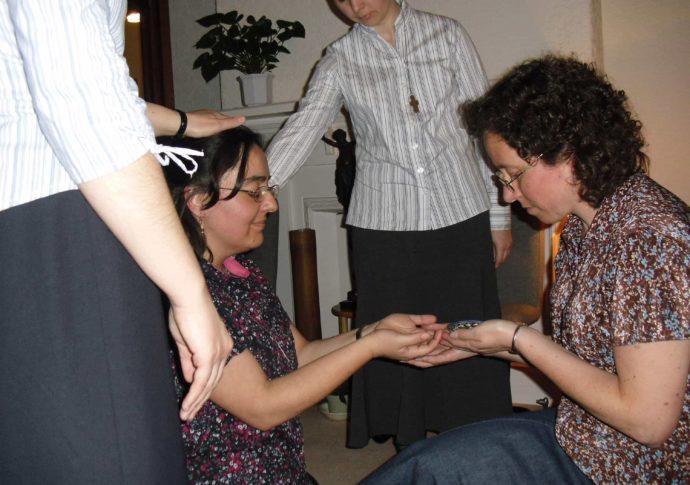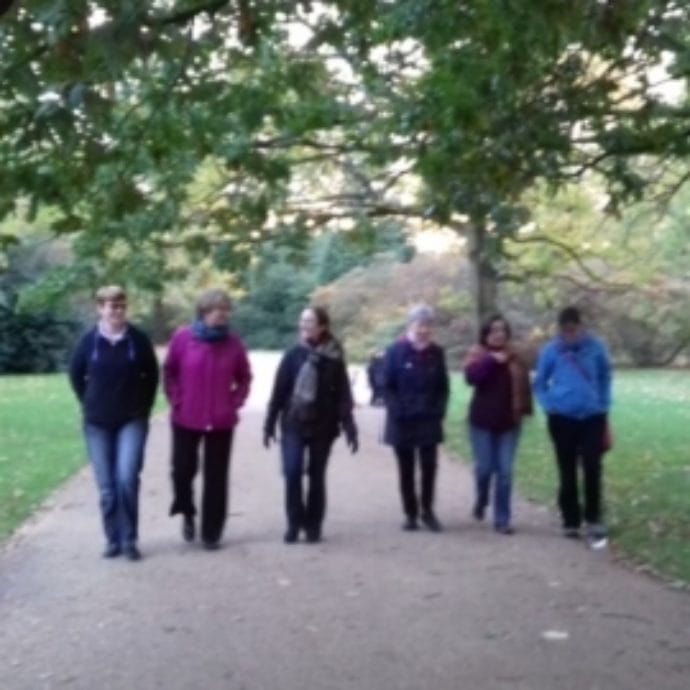In this reflection, first appeared in Church Times, Sr Teresa White fcJ celebrates the Psalms as a pattern for prayer
Anthony de Mello SJ, in one of his story meditations (Taking Flight, Doubleday, 1998), recounts a Hasidic tale about a poor farmer who is coming home from market when a wheel comes off his cart. Stuck in the middle of a forest, it takes him some time to fix the wheel. When he refocuses, he realises that he hasn’t said his prayers. The Hasidim are known for following the letter of God’s Law, and for them that includes praying three times daily, at specific hours.
Unfortunately, the man in the story had left home that morning without his prayer book. Knowing that his poor memory would let him down if he tried to recite the psalms without the text in front of him, he made a quick decision: he would recite the alphabet five times, and leave it to God to put the letters together to form the words that he couldn’t remember. The tale ends in heaven, where God says to the angels: “Of all the prayers I have heard today, this one was undoubtedly the best, because it came from a heart that was simple and sincere.”
We call the Bible “the Word of God”, but the psalms consist of words that express the human side of an honest, heartfelt dialogue with God. It may seem to be a one-sided conversation — God’s part in it is rarely articulated —– but there is a clear sense that God is listening, responding, silently and supportively.
The psalms consist of words that express the human side of an honest, heartfelt dialogue with God.
For those who wrote the psalms, and for those who pray them today, there is a recognition that God is at the heart of life; at the heart of the world and everything in it: “O Lord, you are the centre of my life: I will always praise you, I will always serve you, I will always keep you in my sight” (the refrain from Paul Inwood’s musical version of Psalm 16, Centre of my Life).
But who wants to lead a God-centred life, a holy life? It is probably true that there lurks in many of us, even the most committed, a suspicion that holiness — however desirable in theory — is a solemn undertaking, and perhaps we’re afraid that a holy life would point us towards a dutiful but joyless existence.
The psalmists paint an altogether different picture. They address God directly and personally, and their poems cover a wide range of emotions and moods: joy, praise, and thanksgiving, yes, but also frank questioning and protest, lamentation — even uninhibited cursing.
Most surprisingly of all, sometimes they beg God for vengeance: they want God to help them get even with their rivals, or, more scandalously still, to kill their enemies. And it is clear that the authors expect answers to their questions; why, after all, does God allow bad things to happen to good people? It simply does not make sense for a God of justice and peace to do this, and they do not hesitate to berate him for it. But it is also true that most of the psalms, no matter how vindictive their content, include words of praise and blessing.
The psalmists, believing that there is in every human heart a profound longing that God alone can satisfy, take it for granted that seeking God — holiness — is an integral part of human life and living. Pope Francis would surely subscribe to this: “Do not be afraid of holiness,” he writes in his Apostolic Exhortation Gaudete et Exultate. “It will take away none of your energy, vitality, or joy. On the contrary, you will become what God had in mind when he created you, and you will be faithful to your deepest self.”
This includes, he says, cultivating that “habitual openness to the transcendent” which is so evident in the psalms. Pope Francis’s message is “Seek holiness”; for to be holy is to be truly blessed, and holiness is a gift — he calls it an “attractive” gift — offered by the Holy Spirit to everyone.
The psalmists teach us how to pray with integrity: to come before God as we are, with our sorrows as well as our joys, our sinfulness as well as our devotion, our uncertainties and questions as well as our faith and trust. They rejoice in glimpses of heaven when these are given, but they also openly share agonising experiences of pain, darkness, and despair.
Their habitual awareness of the divine presence in their lives encourages them to turn to God in all that happens to them — good, bad, or indifferent. They certainly take delight in the splendour of creation and in the warmth of human relationships, but they are equally aware of the destruction and corruption that exist, both in the natural world and in human living.
The psalms give us a pattern for prayer — an alphabet of prayer — that enables us to communicate with God at a profound level. They widen our vision, and give us words to pray for gifts that only God can give: love, even for those who hate us; hope, even when things look desperate; peace, even when all that we see is war and conflict.
The psalms give us a pattern for prayer — an alphabet of prayer — that enables us to communicate with God at a profound level. They widen our vision, and give us words to pray for gifts that only God can give.
They help us to discern the letters of words that give voice to the urgent and heartfelt prayers that we desire to pray today, as wars drag on; as we witness poverty, violence, and injustice in our own country and in so many other parts of our troubled world; and as we see the increasing fragility of the natural environment, caused by our broken relationship with the Creator of the universe.
The psalms are soul poems. They remind us that God’s presence is before us, behind us, above us, and beneath us, as it was in the beginning, is now, and always will be.
Image: „Le Nomade”, sculpture de Jaume Plensa. Credit: Florence Piot – stock.adobe.com
This reflection by Teresa White, fcJ has appeared in Church Times in August 2023. Sr Teresa a former teacher, she spent many years in the ministry of spirituality at Katherine House, an FCJ retreat and conference centre in Salford, UK. Her book Hope and the Nearness of God: The Lent Book 2022, was recently published by Bloomsbury.
Read more of Sr Teresa’s contributions in our website, in Thinking Faith. and in Church Times.




















